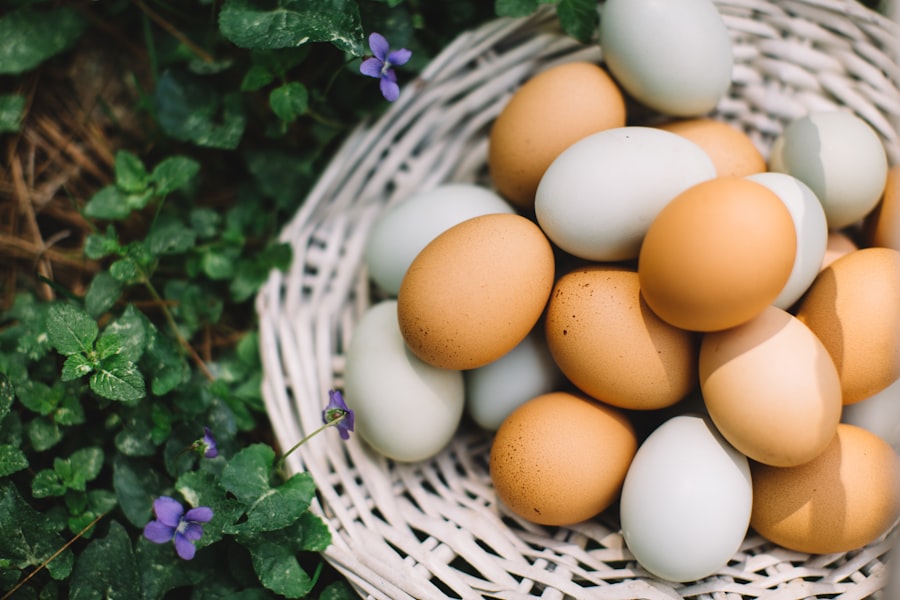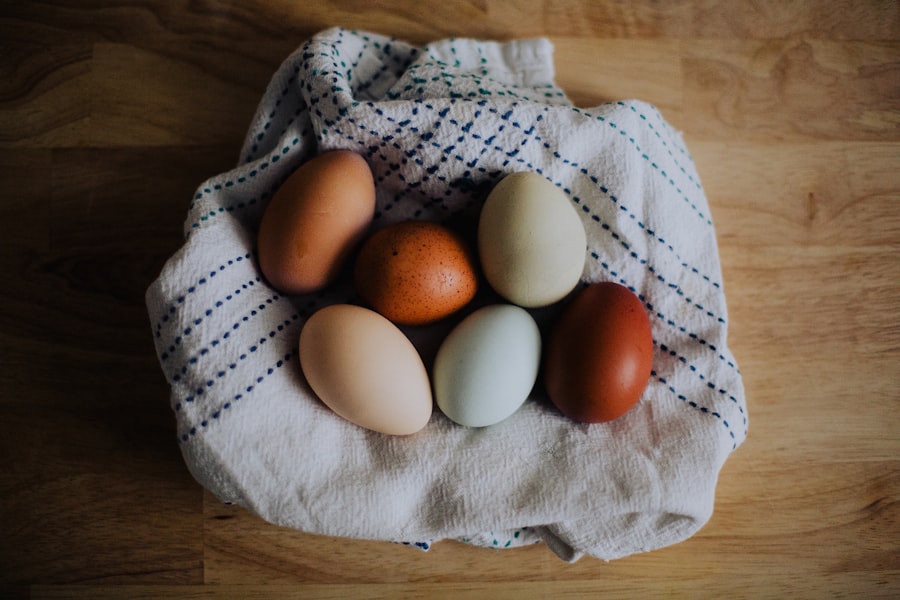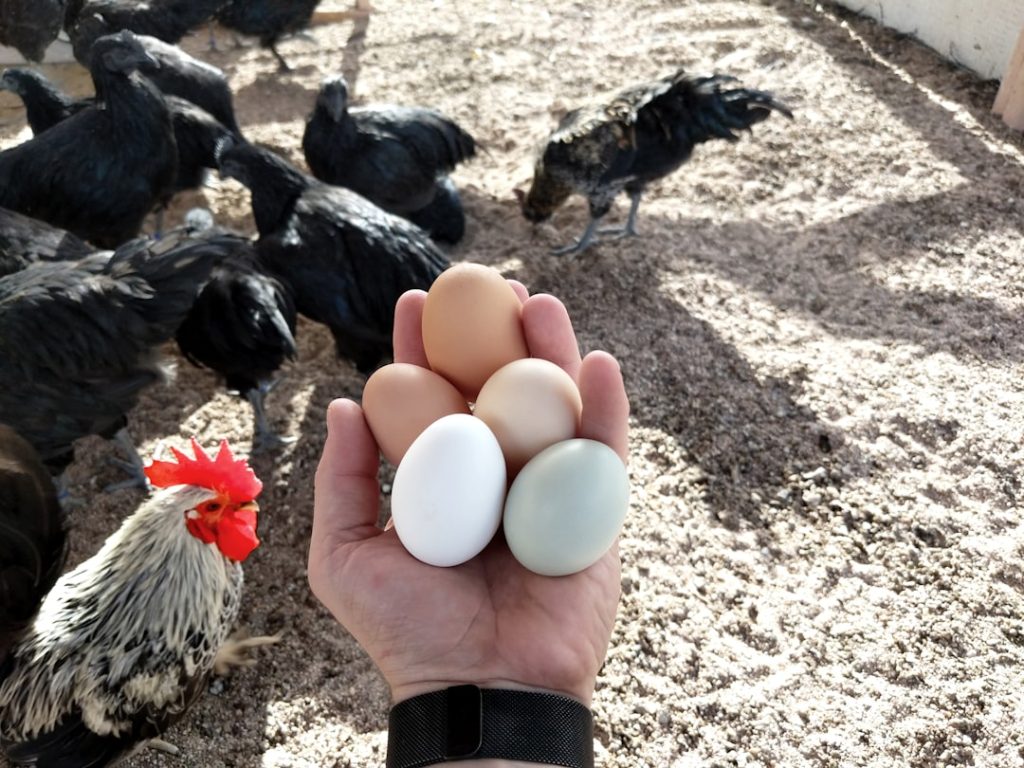Egg freshness is a critical factor in determining egg quality and safety. Fresh eggs exhibit a firm white and a high, round yolk that stands up, with minimal spreading of the white. As eggs age, the white becomes thinner and the yolk flattens, potentially breaking easily and spreading over a larger area.
Fresh eggs have clean, uncracked shells, while older eggs may show cracks or leaks. The water test is an effective method for assessing egg freshness. Place an egg in a bowl of water: if it sinks and lays flat, it’s very fresh; if it stands upright on the bottom, it’s still fresh but should be used soon; if it floats, it’s no longer fresh and should be discarded.
Understanding egg freshness indicators is crucial for ensuring the use of high-quality eggs in cooking and baking. This knowledge helps consumers select the best eggs for their culinary needs and maintain food safety standards in their kitchens.
Table of Contents
Key Takeaways
- Fresh eggs have a firm white and a high, round yolk. The yolk should be free from defects and the white should not spread too much.
- Store fresh eggs in their original carton in the coldest part of the refrigerator, not in the door. This helps maintain their freshness and prevents absorption of strong odors.
- Signs of spoiled eggs include a foul odor, a change in color or texture of the yolk or white, and the egg floating in water.
- Factors affecting egg freshness include temperature, humidity, and air exposure. Keeping eggs at a consistent temperature and humidity level can help maintain their freshness.
- To extend the shelf life of fresh eggs, consider using an egg preserver or coating the eggs with mineral oil to seal the pores in the shell and prevent air and bacteria from entering.
- Older eggs can still be used for baking and cooking, but they may not be suitable for recipes that require a high level of freshness, such as poaching or making meringue.
- Maximizing the freshness of eggs involves proper storage, regular inspection for signs of spoilage, and taking steps to extend their shelf life when necessary.
Proper Storage of Fresh Eggs
Store Eggs in the Coldest Part of the Refrigerator
Eggs should be stored in their original carton in the main body of the refrigerator, rather than the door. This helps to maintain a consistent temperature, which is vital for preserving egg freshness.
Keep Eggs Away from Strong-Smelling Foods
Eggs can easily absorb odors from other foods, so it’s essential to keep them away from strong-smelling foods. This will prevent the eggs from taking on unwanted flavors and odors.
Store Eggs with the Pointed End Down
Storing eggs with the pointed end down helps to keep the yolk centered and maintain its quality. This, combined with storing eggs in their original carton in the coldest part of the refrigerator, will help to keep eggs fresh and of high quality.
Signs of Spoiled Eggs

It’s important to be able to recognize the signs of spoiled eggs to ensure that you are using safe and high-quality ingredients in your cooking and baking. One of the most obvious signs of spoiled eggs is a foul odor. If an egg smells bad, it should be discarded immediately.
Another sign of spoilage is a change in color – fresh egg whites are clear and firm, while older eggs may have cloudy or runny whites. Spoiled eggs may also have an off-putting appearance, with discolored or slimy whites and a flattened or discolored yolk. Additionally, cracked or leaking eggs should be discarded, as they can harbor bacteria and other pathogens.
It’s important to carefully inspect eggs before using them in your recipes to ensure that they are safe and fresh. Recognizing the signs of spoiled eggs is crucial for ensuring that you are using safe and high-quality ingredients in your cooking and baking. Spoiled eggs may have a foul odor, discolored or slimy whites, and flattened or discolored yolks.
Cracked or leaking eggs should also be discarded, as they can harbor bacteria and other pathogens. Carefully inspecting eggs before use is essential for maintaining food safety.
Factors Affecting Egg Freshness
Several factors can affect the freshness of eggs, including temperature, humidity, and handling. Temperature fluctuations can cause condensation on the eggshell, which can lead to bacterial growth and spoilage. Humidity can also impact egg freshness – eggs should be stored in a cool, dry environment to prevent moisture from affecting their quality.
Proper handling is also important for maintaining egg freshness. Rough handling can cause cracks in the eggshell, which can lead to contamination and spoilage. It’s important to handle eggs with care and to store them properly to ensure that they remain fresh and safe to use.
Temperature fluctuations, humidity, and handling can all impact the freshness of eggs. Condensation on the eggshell due to temperature fluctuations can lead to bacterial growth and spoilage, while humidity can affect egg freshness by introducing moisture. Proper handling is also crucial for maintaining egg freshness – rough handling can cause cracks in the eggshell, leading to contamination and spoilage.
Extending the Shelf Life of Fresh Eggs
There are several methods for extending the shelf life of fresh eggs. One common method is to coat the eggs with a thin layer of mineral oil, which helps to seal the pores in the eggshell and prevent air and bacteria from entering the egg. This can help to extend the shelf life of eggs by several weeks.
Another method for extending the shelf life of fresh eggs is to freeze them. Eggs can be frozen either whole or separated into yolks and whites for later use in cooking and baking. When freezing eggs, it’s important to label them with the date of freezing and use them within three months for best quality.
Extending the shelf life of fresh eggs can be achieved through various methods such as coating them with mineral oil to seal the pores in the eggshell and prevent air and bacteria from entering, or freezing them whole or separated into yolks and whites for later use in cooking and baking. Proper labeling and use within three months are important when freezing eggs for best quality.
Using Older Eggs

Hard-Boiling and Meringues
While fresh eggs are ideal for most recipes, older eggs can still be used in certain ways. One great use for older eggs is hard-boiling, as they are easier to peel than very fresh eggs due to changes in pH levels as they age. Additionally, older eggs are perfect for making meringues, as the aged egg whites whip up better than very fresh ones.
Custards and Sauces
Older eggs can also be used in recipes where their slightly looser structure won’t affect the final product negatively. For example, they can be used to make custards and sauces, where their texture won’t be a problem.
Breading and Beyond
Furthermore, older eggs can be used for breading meats or vegetables, as their slightly thicker whites adhere better to the food. This makes them a great option for recipes that require a crispy exterior. By finding alternative uses for older eggs, you can reduce food waste and get the most out of your ingredients.
Maximizing the Freshness of Eggs
In conclusion, understanding egg freshness is essential for ensuring that you are using safe and high-quality ingredients in your cooking and baking. Proper storage, recognizing signs of spoilage, and understanding factors that affect egg freshness are all important aspects of maximizing the freshness of eggs. By following proper storage guidelines, extending shelf life when necessary, and making use of older eggs in suitable recipes, you can ensure that you are getting the most out of your eggs while maintaining food safety and quality.
In conclusion, maximizing the freshness of eggs involves understanding their indicators of freshness, proper storage techniques, recognizing signs of spoilage, understanding factors that affect their freshness, extending shelf life when necessary, and making use of older eggs in suitable recipes. By following these guidelines, you can ensure that you are using safe and high-quality ingredients in your cooking and baking while getting the most out of your eggs.
If you’re wondering how long you can keep fresh eggs from your chickens, you may also be interested in learning about the best type of coop for your chickens. Check out this article to find out more about snaplock chicken coops and how they can benefit your flock.
FAQs
How long can I keep fresh eggs from my chickens?
Fresh eggs from chickens can be kept at room temperature for up to 2 weeks. If refrigerated, they can last for up to 3 months.
How can I tell if an egg is still fresh?
You can tell if an egg is still fresh by performing the water test. Place the egg in a bowl of water – if it sinks to the bottom and lays flat on its side, it’s fresh. If it stands upright or floats, it’s not fresh.
Can I wash fresh eggs before storing them?
It’s best not to wash fresh eggs before storing them, as the protective coating on the eggshell can be removed, making it more susceptible to bacteria. If the eggs are dirty, it’s best to gently wipe them with a dry cloth.
What is the best way to store fresh eggs?
The best way to store fresh eggs is to keep them in their original carton in the refrigerator. This helps to maintain their freshness and prevents them from absorbing strong odors from other foods.
Can I freeze fresh eggs?
Yes, you can freeze fresh eggs. However, it’s best to crack the eggs into a container, gently beat them, and then freeze them. Whole eggs can also be frozen, but it’s best to separate the yolks from the whites before freezing.
Meet Walter, the feathered-friend fanatic of Florida! Nestled in the sunshine state, Walter struts through life with his feathered companions, clucking his way to happiness. With a coop that’s fancier than a five-star hotel, he’s the Don Juan of the chicken world. When he’s not teaching his hens to do the cha-cha, you’ll find him in a heated debate with his prized rooster, Sir Clucks-a-Lot. Walter’s poultry passion is no yolk; he’s the sunny-side-up guy you never knew you needed in your flock of friends!







